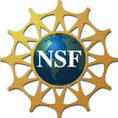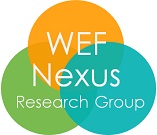NSF-INFEWS DS-WSND 
Decision Support for Water Stressed Nexus Decisions (DS-WSND)
This research is funded by the National Science Foundation (NSF) award 1739977
B. McCarl, E. Pistikopoulos, R. Mohtar, K. Schwabe, R. Srinivasan, R. Rosen
Completed 2024: The work built on extensive TX and CA water and food studies and on the team’s expertise and experience with grower groups, farm and extension advisers, and energy/water stakeholders.
Securing Water-Energy-Food for the Nation’s Future Final Workshop – San Antonio, November 2022
Nexus studies assume consideration of the full Nexus system with the goal of leading to opportunities for improved decision making. A desirable Nexus setting is one in which scarcity in water, energy, and food commodities influence current resource management and allocation decisions. Nationally and globally, many regions fit this setting. By focusing on Nexus issues under water scarcity generally, and in Texas and California specifically, where rapid population growth, competition for primary resources, and expensive proposed water supply schemes. DS-WSND integrates a data system, energy production modeling, ground and surface water hydrology modeling, agricultural modeling, a Nexus wide stochastic, mixed integer programming project selection model and a Nexus Tool that supports visualization enhanced scenario and trade-off evaluation with stakeholders.
The study builds on extensive Texas and California water and food studies, plus significant energy and energy/water research. In addition to starting with substantial data developed under past efforts, remaining data gaps have been identified and sources located. Our team has considerable outreach expertise and experience with grower groups, farm and extension advisers, and energy/water stakeholders in both case study regions. The team includes experts across relevant Nexus areas: analysis and modeling/data handling/visualization, with the goal of creating and releasing useful tools to the wider community by using direct case studies involving stakeholders and advancing Nexus education at participating and nonparticipating institutions through web released materials and educating students. Project outcomes will be integrated into graduate courses with materials available online that will amplify national and international impact; they will be shared with the science community and wider audiences through conferences, reports, journal articles and workshops.
Products and Outcomes (NSF award #1739977)
Please use the links below for access to the products of the project, including:
Peer Reviewed Journal Articles
Project reports
- Engagement Webpage – The page now includes information on the project, involved PIs and students, and Summary Report of Jan Engagement workshop. Full report in preparation with Outreach team will also be uploaded once ready for sharing. Link is INFEWS project page.
- Rosen, Rudolph A, Bassell Daher and Rabi H Mohtar, 2018 Water – Energy – Food Nexus Stakeholder Information Sharing and Engagement Report Workshop. The Texas A&M University System, College Station Texas. Available at https://libguides.tamusa.edu/ld.php?content_id=41591901.
Book Chapters
- McCarl, B.A., and Y.Q. Yang, Economic Considerations When Appraising Nexus Decision-Making, In P. Saundry & B. L. Ruddell (Eds.), The Food-Energy-Water Nexus(pp. 129-151). Springer.
- Kinne, B., Magee, D., McCarl, B. A., Mohtar, R., Richardson, R. B., Ruddell, B. L., Saundry, P., & Treemore-Spears, L. (2020). Opportunities at the nexus. In P. Saundry & B. L. Ruddell (Eds.), The Food-Energy-Water Nexus (pp. 587-611). Springer.
- Almut, A., F. Denton, F. Agus, A. Elbehri, K. Erb, B. Osman-Elasha, M. Rahimi, M. Rounsevell, A. Spence, R. Valentini, R. Hillerbrand, E. Aldrian, B.A. McCarl, M.J. Sanz-Sanchez, and Y. Bai, “Chapter 1: Framing and Context”, Special Report on Climate Change & Land, 2019. (Note this does not acknowledge the NSF project because it is IPCC policy not to it include acknowledgments nevertheless NSF support contributed to this internationally important piece).
Posters
- Daher, B., Lee, S., Kaushik, V., Blake, J., Askariyeh, M. H., Shafiezadeh, H., Mohtar, R. H. (2019) Towards bridging the water gap in Texas: A water-energy-food nexus approach. Texas Water 2019 conference
- Jha, A., Ajami, H., Schreiner-McGraw, A (2019) Understanding Hydrologic Response of and Arid, Irrigated Watershed to Changing Climate Using a Watershed Scale Model. Poster Presentation, UCR EDGE Institute Spring Symposium, Riverside, CA.
- McCarl, B.A., C.J. Fei, R.J. Hogan Jr., H. Ajami, R.H. Mohtar, E.N. Pistikopoulos, R. Rosen, K.A. Schwabe, R. Srinivasan, R.B. Stevens, Y.Q. Yang, and L. Wu, “Decision Support for Water Stressed FEW Nexus Decisions: Annual meeting”, NSF, Washington D.C., 2018.
Seminars
- Fei, C.J., B.A. McCarl, and Y.Q. Yang, “FEW Nexus Water Scarcity”, Seminar given at TAMU Agricultural Economics, 2018.
- McCarl, B.A., “EDSIMR – a regional FEW model”, paper for small seminar of WEF Nexus modeling for NSF team, 2018.
- McCarl, B.A., “Report for Modeling Team”, Presented at WEF Meeting in San Antonio, 2018.
Theses/Dissertations (can be accessed at the OAKTrust)
- Aurora M Vargas, Three Essays on Freshwater Supply, Fracking Use, and Agricultural Technological Progress. Texas A&M University, May 2020.
- ChengCheng Fei, Three Essays on Food-Energy-Water Nexus Analysis and Afghanistan Food Security and Poverty, Texas A&M University, August, 2019 (TAMU Research Associate)
- Yingqian Yang, Economics of Energy Sector in FEW Nexus Water Stressed Region: A Case Study in South Central Texas, Texas A&M University, August, 2019 (in market)
- Anastasia Thayer, Three Essays on Drivers of Agricultural Change in Texas, Texas A&M University, Aug, 2018 (Utah State)
- Bassel Daher, Bridging physical and social sciences to unlock new potential for addressing interconnected resource challenges, Texas A&M University, May 2018 (EES Energy Institute, Texas a&M University)
Webinar outcome of the Science of the Total Environment (STOTEN) Special Issue
The Webinar shared the research outcomes that were published as part of the STOTEN Special Issue: Opportunities in the Water-Energy-Food Nexus Approach: Innovatively driving economic development, social well-being, and environmental sustainability. The American University of Beirut (AUB) and Texas A&M University (TAMU) co-hosted a webinar (November 27, 2018) and presented the findings of the ‘San Antonio Case Studies of the Texas A&M WEF Nexus Initiative. The experience of the Texas A&M University WaterEnergy-Food Nexus Initiative (WEFNI), a University wide, four year, investigatory experience in support of planning for the water, energy, and food resource nexus in San Antonio and surrounding regions and as climate and urban growth alter water supplies. The System wide effort, led by Professor Rabi H. Mohtar, WEFNI Coordinator, TEES Research Professor, Texas A&M University, College Station Texas, and Dean, Faculty of Agricultural and Food Sciences (FAFS), American University of Beirut (AUB). Members of the WEFNI Leadership Team included: Bruce McCarl, Kent E. Portney, Efstratios N. Pistikopoulos, Rudolph A. Rosen, Jack Baldauf, and David Baltensperger.

 WEF Nexus Research Group
WEF Nexus Research Group